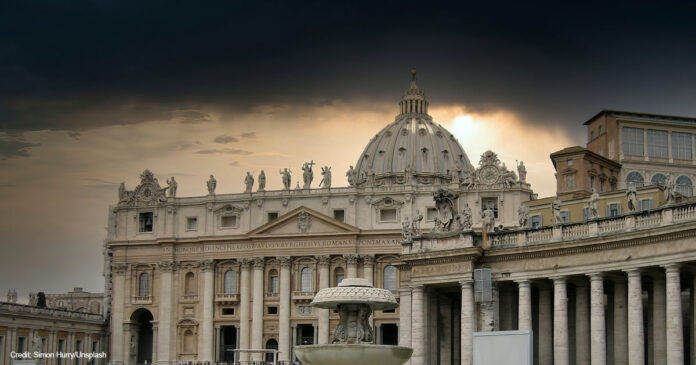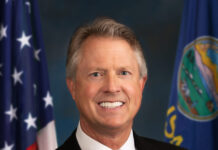By S.A. McCarthy
The Washington Stand
Monday morning was rife with headlines claiming that Pope Francis and the Vatican were greenlighting blessings for same-sex unions. For all the brouhaha raised — both by pro-LGBT leftists and undoubtedly well-intentioned conservatives — one crucial fact was largely overlooked: the Catholic Church did not approve blessings for same-sex unions.
At issue is a new declaration, “Fiducia Supplicans,” issued Monday morning by the Vatican’s doctrine office. In it, the newly-appointed progressive head of the Dicastery for the Doctrine of the Faith (DDF), Archbishop Víctor Manuel Fernández, laid out new norms for administering blessings in the Catholic Church, “based on the pastoral vision of Pope Francis.” Contrary to mainstream media claims on the subject, the Catholic Church’s perennial moral teachings on sex and marriage have not been changed, nor will they be changed.
Is the Catholic Church Blessing Same-Sex Unions?
The document itself is abundantly clear that same-sex unions are in no way analogous to the sacrament of marriage, as same-sex relationships are, according to the Catechism of the Catholic Church, “intrinsically disordered” because they reject God’s vision for sex, procreation, and the family. The Catechism also defines homosexual actions as “acts of grave depravity.” Monday’s declaration reaffirms “the perennial Catholic doctrine of marriage; it is only in this context that sexual relations find their natural, proper, and fully human meaning. The Church’s doctrine on this point remains firm.” The declaration adds, “This is also the understanding of marriage that is offered by the Gospel.”
This position has been consistently upheld by Pope Francis. In 2021, the pontiff and the DDF responded to a question posed by German cardinals regarding whether or not same-sex unions can be blessed. The Vatican response bluntly stated, “Negative.” In the text issued by the DDF and personally approved by Pope Francis, it was explained that blessings are, in Catholic theology, sacramentals. Sacramentals are “sacred signs” which are intended to prepare the soul to approach a specific sacrament and to dispose that soul to receive the graces that sacrament imparts. Since same-sex unions cannot approach the sacrament of marriage, they cannot therefore be blessed either. The 2021 document explained that “when a blessing is invoked on particular human relationships, in addition to the right intention of those who participate, it is necessary that what is blessed be objectively and positively ordered to receive and express grace, according to the designs of God inscribed in creation, and fully revealed by Christ…”
“Therefore, only those realities which are in themselves ordered to serve those ends are congruent with the essence of the blessing imparted by the Church,” the document stated. “For this reason, it is not licit to impart a blessing on relationships, or partnerships, even stable, that involve sexual activity outside of marriage … as is the case of the unions between persons of the same sex.” The document concluded that God “does not and cannot bless sin: he blesses sinful man, so that he may recognize that he is part of his plan of love and allow himself to be changed by him.”
“The Church has a very clear understanding of marriage: an exclusive, stable, and indissoluble union between a man and a woman, naturally open to procreation. Only this union can be called ‘marriage.’ … It is not just a matter of names, but the reality we call marriage has a unique essential constitution that requires an exclusive name, not applicable to other realities. It is undoubtedly much more than a mere ‘ideal.’ For this reason, the Church avoids any type of rite or sacramental that might contradict this conviction and suggest that something that is not marriage is recognized as marriage.”
While upholding the declaration that same-sex relationships cannot be blessed, Pope Francis continued to explain that “pastoral charity” may demand some kind of non-ritual blessing be offered to the people in same-sex relationships, without actually approving or condoning their sinful behavior or legitimizing their disordered relationship.
Then, as now, mainstream media had a field day, proudly proclaiming that the pope had “left the door open” for blessing same-sex unions, despite his definitive rejection of the notion. Just so, claims that the Vatican approved blessings for same-sex unions on Monday are factually inaccurate. The DDF stated from the outset that “this Declaration remains firm on the traditional doctrine of the Church about marriage, not allowing any type of liturgical rite or blessing similar to a liturgical rite that can create confusion.”
Relying on longstanding and oft-repeated Catholic moral teaching and theology, the document states that “rites and prayers that could create confusion between what constitutes marriage — which is the ‘exclusive, stable, and indissoluble union between a man and a woman, naturally open to the generation of children’ — and what contradicts it are inadmissible.” Thus, “when it comes to blessings, the Church has the right and the duty to avoid any rite that might contradict this conviction or lead to confusion.” That is to say, the Catholic Church cannot confer upon a same-sex union the same blessings it would upon, say, a man and a woman’s engagement.
What Does the Vatican Statement Change?
The source of the confusion and controversy lays in the declaration’s assertion that same-sex couples can request blessings from Catholic priests — and priests now have the Vatican’s own blessing to grant them. The key distinction to bear in mind here is between same-sex unions and same-sex couples. Same-sex unions are, as outlined above, intrinsically and inherently sinful and disordered; but the people in those unions are not.
This not just a matter of meaningless semantics but a crucial distinction: a sinful union cannot be blessed because there is no hope of sin fulfilling God’s will, but people can be blessed, even if they are engaged in sin, because there is still the hope that they might reject their sin and fulfill God’s will. In fact, the blessing is a means of helping them to achieve that goal.
In the case of marriage, the declaration explains that “the blessing given by the ordained minister is tied directly to the specific union of a man and a woman, who establish an exclusive and indissoluble covenant by their consent. This fact allows us to highlight the risk of confusing a blessing given to any other union with the Rite that is proper to the Sacrament of Marriage.” Thus, it is not same-sex unions which the Vatican is extending a blessing to, but rather people, including those who are in same-sex relationships.
This is not a wholly novel concept in Catholic practice. For example, the Catholic Church prohibits those in a state of mortal (or grave) sin from receiving Holy Communion until they have repented of their sin and attended the sacrament of confession. But even those in a state of mortal sin may still present themselves at the Communion rail to receive a blessing from the priest.
The declaration’s innovation comes in denoting a type of blessing referred to as “spontaneous.” The confusion and controversy surrounding the document’s publication has no doubt been exacerbated by the absence of a clear definition of what these “spontaneous” blessings are to look like. While blessings in the Catholic Church typically follow a prescribed ritualistic form, these “spontaneous” blessings are intended to be “informal.” The declaration explains, “There are several occasions when people spontaneously ask for a blessing, whether on pilgrimages, at shrines, or even on the street when they meet a priest.” The document explains that, prior to offering a blessing to same-sex couples, the Catholic priest should pray for the well-being and salvation of the couple, including that they might have “God’s light and strength to be able to fulfill his will completely.”
The document also clarifies that the blessing may in no way resemble a liturgical ceremony or blessing: it “should never be imparted in concurrence with the ceremonies of a civil union, and not even in connection with them. Nor can it be performed with any clothing, gestures, or words that are proper to a wedding.” The declaration explains that “there is no intention to legitimize anything, but rather to open one’s life to God, to ask for his help to live better, and also to invoke the Holy Spirit so that the values of the Gospel may be lived with greater faithfulness.”
What’s the Fallout?
Unfortunately, toward the document’s conclusion, it states, “What has been said in this Declaration regarding the blessings of same-sex couples is sufficient to guide the prudent and fatherly discernment of ordained ministers in this regard. Thus, beyond the guidance provided above, no further responses should be expected about possible ways to regulate details or practicalities regarding blessings of this type.”
Given the non-prescriptive nature of the newly-denoted “spontaneous” blessings, such a caveat was inevitable. However, the total absence of definition and regulation will also be disastrous. Jesuit priest James Martin, a vociferous proponent of the LGBT agenda, called the declaration “a big shift in how the Church looks at same-sex couples.” He explained that, previously, he would not have been permitted to publicly provide a blessing to same-sex couples, but now they can ask him, “‘Can you come to the park and do a little blessing for us outside or come to our house in the backyard?’ That’s a big deal.” In his analysis, Martin conflated blessing same-sex unions with blessing same-sex couples, correctly noting that the Vatican’s 2021 statement prohibited blessing same-sex unions, but claiming that Monday’s declaration was a tract on “why we can do that.”
Of import, Martin pointed out that the Vatican’s declaration does not stipulate that such blessings are to be regulated by the local Catholic bishop or regional bishops’ conference. In theory, this means that a progressive priest could not be halted or prevented by a theologically-conservative bishop from abusing the norms established on Monday.
Of course, not all bishops would even try to block their priests from erroneously blessing same-sex unions in the first place. Earlier this year, the Catholic bishops of Germany overwhelmingly approved a document — in direct defiance of Vatican directives — promoting the blessing of same-sex unions. The proposal classified homosexuality as “a norm variant of human sexuality” and urged bishops to “officially allow blessing ceremonies in their dioceses for couples who love each other but to whom sacramental marriage is not accessible or who do not see themselves at a point of entering into a sacramental marriage.”
One German prelate, Cardinal Rainer Maria Woelki, tried to discipline a priest in his diocese for blessing same-sex unions. Woelki was promptly reprimanded by the Central Committee of German Catholics. Inspired by this, other priests in Woelki’s diocese disobeyed their bishop and the Vatican to host a rainbow-flag-studded gay blessing ceremony outside the Cologne cathedral. In a letter last month, Pope Francis admitted that Germany’s pro-LGBT bishops were trying to “steer” the Catholic Church in Germany “increasingly away from the universal Church’s common path.”
However, the progressive German prelates still retain their posts, having been criticized in letters but not formally disciplined. Meanwhile, bishops who boldly uphold a biblical understanding of sex and marriage, such as Texan Bishop Joseph Strickland or former Vatican official Cardinal Raymond Burke, are ostracized and penalized. However, the norms promulgated by the Vatican on Monday are abused, it is increasingly unlikely that the abusers will be reprimanded, but priests and bishops faithful to Scripture and the doctrines of the Catholic Church will still risk running afoul of the reigning pontificate, which the late Australian Cardinal George Pell described as a “catastrophe.”
Of note, the Vatican’s “Fiducia Supplicans” declaration is predicated almost entirely on Pope Francis’s own thinking. Out of the 31 footnotes marking citations, 20 of them are citations from Pope Francis’s previous writings. That means that two-thirds of the theology cited in “broadening” the theology of blessings is Pope Francis’s own, not longstanding Catholic teaching. In fact, only three citations in the document are taken from before Francis’s pontificate began and not a single one is taken from before the year 1985, demonstrating that the current pope is not attempting to elucidate, safeguard, or preserve the 2,000-year-old tradition of the Catholic Church, but simply promote and establish his own ideas and assert his own prominence as a theologian.
Although not technically a departure from or contradiction of Catholic teaching, the new declaration is nonetheless a shocking and arguably unprecedented effort to allow progressive ideology to run rampant in the halls of the Catholic Church while still claiming faithfulness to the letter of the law.

















